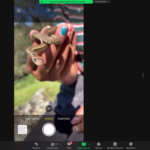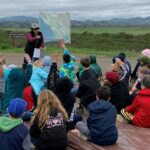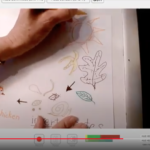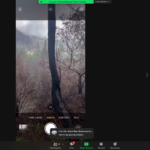May 27, 2021
Posted in: News Articles
Adapting youth environmental education to the virtual world
Just a couple weeks after Sonoma County began to Shelter-in-Place, Ag + Open Space signed contracts with six outstanding local public outings and youth education providers – Laguna de Santa Rosa Foundation, LandPaths, Sonoma Ecology Center, Sonoma Land Trust, and the Sonoma and Gold Ridge Resource Conservation Districts. Without hesitation, all partners agreed we should do whatever we could during the pandemic to provide opportunities for our communities to learn from and connect with our incredible working and natural lands.
So far this year we’ve more than doubled the reach of these programs, and have had over 5,300 youth participate in one or more of our youth education virtual experiences! While there is nothing that can replace on-land experiences, this shift to virtual programming has enabled us to connect with more teachers and students, and allowed us to utilize new accessibility tools like live translation and closed captioning.
We’ve also reached more students at middle schools, after partners connected with teachers to adapt the elementary school curriculum to align with middle school standards and best practices.
Read on below to learn more about the unique and fantastic ways each of our partners responded to the pandemic by creating new, invaluable resources to support teachers and students during an incredibly trying year.
Laguna de Santa Rosa Foundation
The Laguna de Santa Rosa Foundation’s Learning Laguna school program for 2nd-4th graders has been going strong for 22 years. To adapt the program to distance learning, the Laguna Foundation re-worked their “regular” Learning Laguna activities, and created several new independent activities, videos, and interactive activities that helped teachers meet their curriculum goals, and engaged students in learning about the Laguna ecosystem, their local creek, and home watershed. Once they had developed these new lesson plans, they then connected with classes across the county so set up a series of virtual classroom visits led by Laguna staff and volunteer docents.
One silver lining of this year is that these educational materials, including videos and independent learning activities, have been shared for teachers to also use on their own, so that the program’s reach has expanded and we can connect more children to the Laguna and their home environment.
Teacher feedback: “WOW! You guys have been busy and the materials are amazing. The activities dovetail beautifully with lots of work we are doing. Thank you for all you are bringing to our students.”
LandPaths
Over at LandPaths, they re-envisioned their youth education program for the virtual space by creating IOOBY (In Our Own Backyard) “Live from the Preserve”. Through this program, students took multiple virtual trips to preserves early in the school year during which they worked on observation skills in nature, asking questions, and making connections. With LandPaths staff virtually visiting classrooms live from preserves, students had an especially exciting and more tangible experience connecting with these lands (especially when snakes and cows joined in on the fun). The photo below is of a later lesson that built upon an earlier virtual visit, with more specific focus on plant and animal adaptations.
And, we are thrilled to announce that as of April 12th, 2021, elementary students have been back in the field with all Covid safety protocols in place. Teachers express holding back tears as they watch their students “come alive again” bonding with each other and the land. The youth are filled with awe and wonder as they climb trees, search for critters, and hold a gopher snake for the first time.
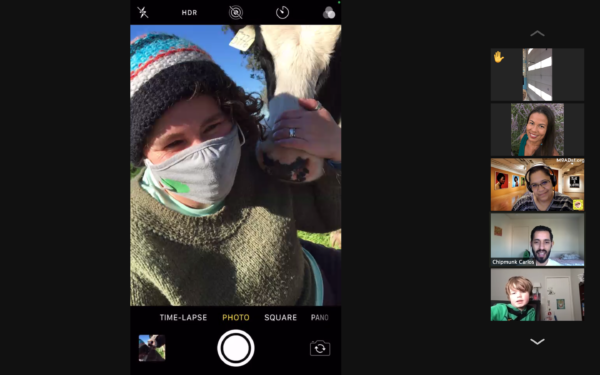
While leading a different virtual visit to Taylor Mountain that focused on habitat and adaptation, a cow kept licking the presenter’s hat, and the students from McDowell Elementary loved it!
Sonoma Ecology Center
To shift to virtual learning, Sonoma Ecology Center educators developed virtual lessons to support 4th grade students throughout Sonoma Valley. In fact, during the last school year every public school in Sonoma Valley signed up for the five-lesson series! From providing electronic unit packets of lessons for teachers, to staff leading flower and salmon dissections live online, students were given an up-close experience through the pandemic. Students also explored their own backyards and kitchens to learn about nature’s decomposers, pollinators and food webs. For staff and students alike, it was very uplifting to find some normalcy through these virtual classroom visits.
Sonoma Land Trust
This past year, we formed a new partnership with Sonoma Land Trust to support their Students Learning In Marsh Environments (SLIME) that focuses on connecting 3rd and 4th grade students with the salt marsh ecosystems of the San Pablo Bay National Wildlife Refuge.
Through virtual classroom visits, students were able to build a sense of place through photos, videos, and maps while learning about a range of topics including ecosystem function and biodiversity, conservation and restoration, and climate change and resilience. The pivot to virtual also allowed for the Land Trust to pilot SLIME en español for Spanish immersion schools.
Thanks to feedback from teachers about the success of virtual SLIME, the Land Trust foresees continuing the SLIME program virtually as an option for teachers, in addition to a more traditional field trip structure.
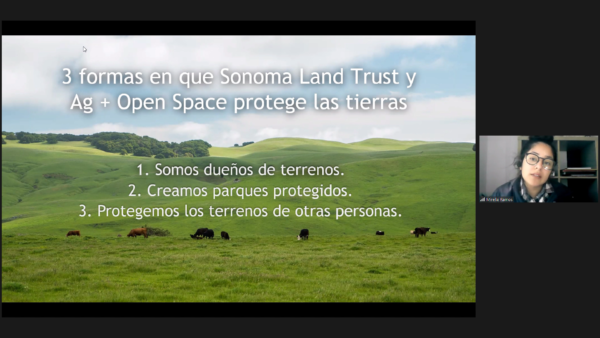
Students learn about conservation including easements during SLIME en español.
Sonoma and Gold Ridge RCDs:
We partner with the the Sonoma and Gold Ridge Resource Conservation Districts (RCDs), on two programs: the FARMS leadership program that engages local high school students in learning about agriculture and land stewardship, and the TEAM program, that enhances elementary school students’ learning about and connection to agriculture.
During this year’s FARMS programming, students explored farm ecosystems and biodiversity through a pre-recorded farm visit, learned about our forests and fire with the RCD’s Registered Professional Forester, received an introduction on Traditional Ecological Knowledge from Nick Tipon – member and elder of the Federated Indians of Graton Rancheria, and analyzed the relationship between how healthy soils can help us mitigate the effects of climate change over time through a demonstration with one of the RCD’s project managers.
The TEAM program developed a virtual farm visit at Open Field Farm in Petaluma, as an interactive, fun and engaging farm experience available right at home. Through a three-part, asynchronous video series, 3rd-5th grade students explore the land and its many interconnected systems, meet the many faces of the farm workers and animals, harvest fresh food from the CSA barn, hear about community supported agriculture, and study the importance of pollinators – the smallest farmers of all – to ag production.
